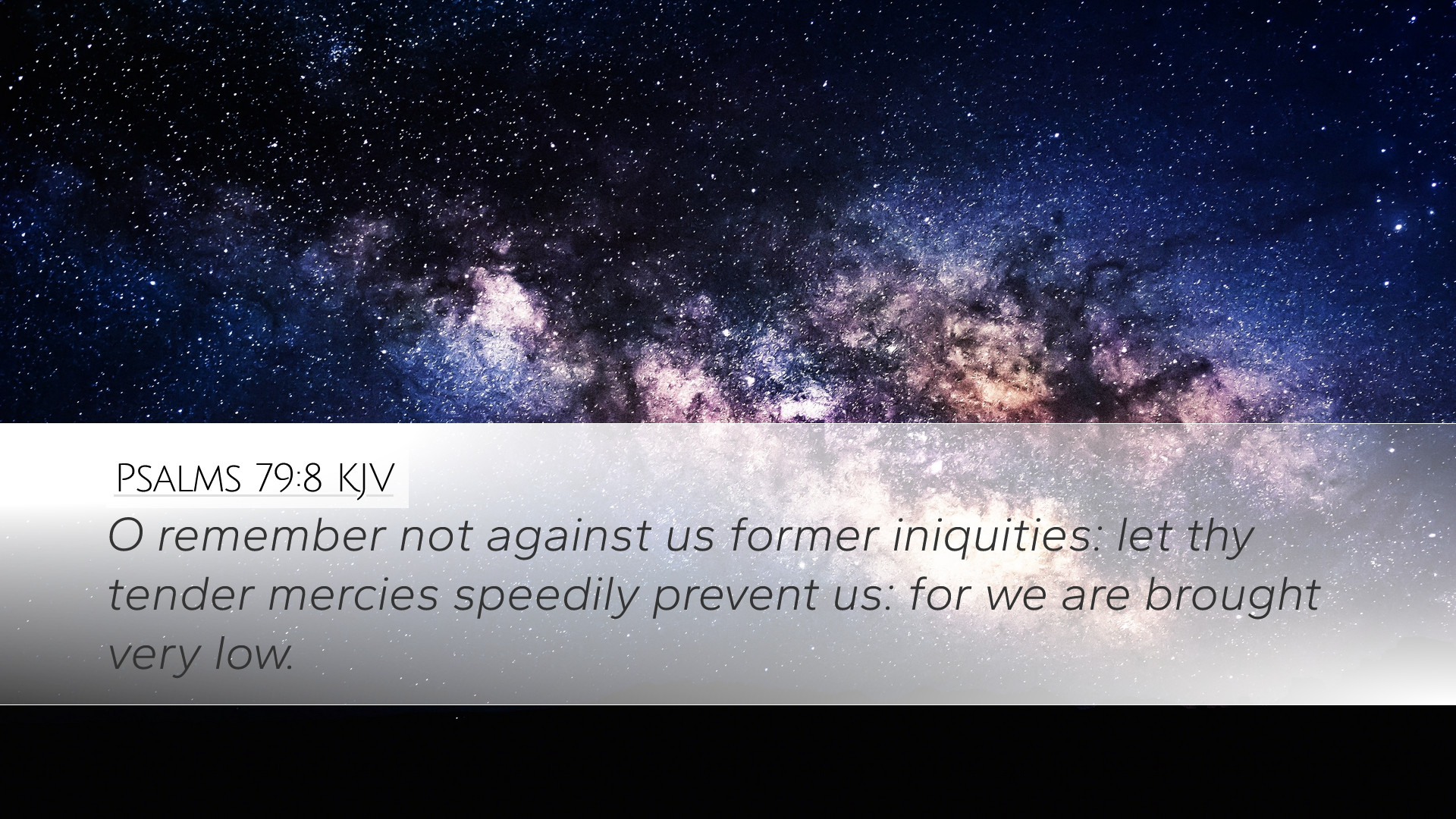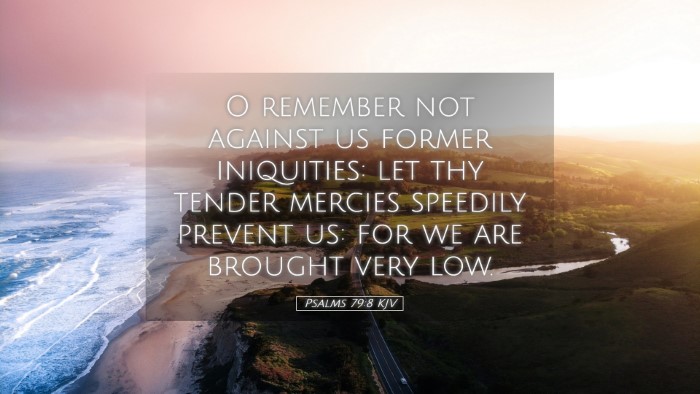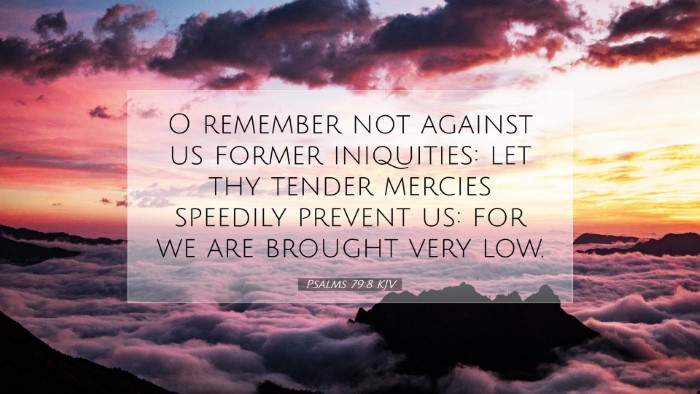Commentary on Psalms 79:8
Verse Reference: Psalms 79:8 - "O remember not against us former iniquities: let thy tender mercies speedily prevent us: for we are brought very low."
Introduction
The psalmist expresses a heartfelt plea for divine mercy in this poignant verse, encapsulating deep anguish and a desire for restoration. The context of this psalm reflects a period of national calamity, likely during the Babylonian exile or a related crisis in Israel's history. As we delve into the verse with insights from renowned biblical commentators such as Matthew Henry, Albert Barnes, and Adam Clarke, we uncover layers of meaning relevant to pastors, students, theologians, and Bible scholars.
Commentary Insights
1. The Appeal for Mercy
Matthew Henry emphasizes the significance of the psalmist's request for God to "remember not against us former iniquities." This plea is central to understanding human frailty and the profound longing for divine compassion. Henry notes that the psalmist acknowledges the reality of past sins but seeks God's forbearance, recognizing that humanity is often burdened by its transgressions. This line reflects a universal spiritual principle: the need for grace while grappling with the consequences of sin.
Albert Barnes elaborates on this, stating that the appeal is not merely about forgetting past deeds but about receiving forgiveness and cleansing. He asserts that the consciousness of sin is often a hindrance to experiencing God’s mercy. Therefore, the psalmist's plea for God’s tender mercies to "speedily prevent us" reveals an understanding that immediate divine intervention is crucial in times of distress.
2. The Nature of God's Mercy
Adam Clarke provides an insightful discussion of the characteristics of God’s mercy. Clarke reminds us that God’s mercy is foundational to His character and operates in line with His covenant faithfulness. The term "tender mercies" evokes feelings of warmth and compassion, suggesting that God’s love is not only vast but also deeply personal. It reflects the divine willingness to engage with human suffering in a compassionate manner.
Moreover, Clarke notes the dynamic interplay between God’s mercy and human helplessness. The phrase "for we are brought very low" articulates a state of desperation and vulnerability, where the psalmist recognizes the dire condition of his people. He asserts that understanding our lowliness is key to grasping the magnitude of divine mercy.
3. The Context of Distress
The historical and situational context of Psalms 79 enhances the emotional weight of this verse. The psalm is a communal lament, entreating God amidst a backdrop of devastation, whether it be a result of foreign conquest or internal moral failure. Matthew Henry points out that the plea for mercy arises from a corporate awareness of guilt, indicating that the nation is in turmoil due to collective sin.
Barnes provides a similar perspective, recognizing the communal aspect of this lament. He suggests that the pain experienced by the individual is reflective of a larger national crisis, wherein the people's transgressions have led to their suffering. This serves as an important reminder for modern congregational leaders and scholars about the weightage of collective accountability in the spiritual realm.
4. The Urgency of the Plea
The urgency expressed in the plea "let thy tender mercies speedily prevent us" indicates a profound sense of immediacy. Both Barnes and Clarke highlight that the timing of divine intervention is critical. The psalmist's recognition of being "brought very low" necessitates prompt action from God, illustrating how spiritual crises often demand quick resolution.
This urgent appeal aligns with the pastoral responsibility to encourage believers to seek God earnestly in their times of need. The implications of such urgency resonate deeply within the teachings of many churches today, emphasizing reliance on God’s intervention in moments of despair.
5. Application for Today
The message of Psalms 79:8 is timeless. For pastors and church leaders, it serves as a reminder of the importance of cultivating an environment of grace and mercy within their congregations. It challenges congregants to acknowledge their shortcomings while simultaneously affirming their faith in God’s boundless compassion.
Students and scholars may also find rich material in the theological and moral implications of this verse. It invites deeper reflection on the nature of repentance, the role of community in spiritual restoration, and the character of God as unwaveringly merciful.
- Encourage Confession: Leaders should create spaces for honest confession and acknowledgment of sin within the church community.
- Promote Understanding of Divine Mercy: Teach congregants about the depth of God's mercy and how it can transform their lives.
- Foster Communal Lament: Engage the church in communal prayers that acknowledge collective sin and seek restoration.
Conclusion
Psalms 79:8 encapsulates a profound appeal for mercy, drawing from the depths of human despair and the high hope in divine compassion. Engaging with the insights from public domain commentaries enriches our understanding of this verse and emphasizes its relevance in spiritual discourse today. As believers navigate their own struggles, they will find solace in the reminder that God's tender mercies are always available to those who earnestly seek His face.


